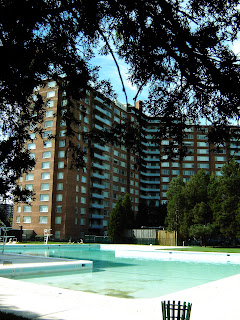
They say that truly great friends are hard to find, difficult to leave and impossible to forget. I have so few of them, I'd have trouble forgetting even if I tried to.
But there was something special about my friend Bing Formento
(in the photo, flanking "Tabako" as we affectionately called former President Fidel V. Ramos and DZRH commentator Rey Langit to his right). I just learned he bought a new restaurant called the
Batter Beater Cafe in Las Vegas. As expected, it's a family affair -- Bing's life always revolved around his energetic wife Nora and their children, specially their only daughter May-May (last time I saw her, she was barely past a toddler; I was happy to learn she's gotten married and appeared pregnant in the pictures). That was something I always admired in Bing. Along with his deep belief in Divine destiny and a never-say-die, damn-the-torpedoes attitude to pursuing his life's goals.
I wasn't quite sure what was happening when my bosses at the Evening Star -- Ka Louie Beltran, Angel Sambo and Jun Varela -- first introduced me to Bing. I was told I was moving to the defense beat, after covering the "dead beats" of San Juan and Mandaluyung cities. But they were pairing me up with Bing. He was already a virtual media institution at Camp Aguinaldo, his was a household name, with his urgent, distinctive baritone. He was well known for his work with radio station DZRH, but Bing was just starting out in newspapers, and the Evening Star "trinity" wanted me to help him along.

He was an excellent news gatherer, I was told, but he needed help putting the ideas and information into the written word. That was my "secret mission", Angel directed, after pulling me aside after the introduction to Bing. It was the start of a happy, prolific and sometimes funny collaboration.
But Bing was generous, I quickly discovered, sometimes to a fault. And he was generous in almost all things.
He did not hide his sources as most veteran reporters working with young ambitious, upstarts are wont to do. We started work early and were cultivating our next day's stories just as the main pack of defense reporters were starting to write theirs for that day. The other reporters tended to devote their time to finding out what Bing was up to -- he became a virtual "beat" all his own.
I count myself lucky to have seen how he worked his sources. Bing was a good listener, he tried to get a grasp of the issues -- sometimes failing miserably -- but more than anything else, he "felt" for the people he dealt with. He suffered with the oppressed and was infuriated with the oppressors. His voice, more than anything else, betrayed his emotions. During the 1989
coup d'etat, when Camp Aguinaldo was being bombed by rebel artillery, he virtually invented a Pilipino word -- "tumilampon" (actually he meant to say "tumilapon") -- while describing blow-by-blow, live on DZRH, the sickening sight of shells exploding nearby. Sometimes, his rapid-fire reporting outraced his thoughts.
We were caught in a White Plains house by a bombing run by pro-government "Tora-Tora" planes. It was my baptism of fire, the first time I've been caught in the middle of actual combat. We were trying to get an interview with Col. Romilino Gojo, the mutinous commander of the 4th Marine Battalion who was holed up in the house. We got separated for awhile as I sought shelter behind bed cushions in a den. Bing had a wry smile, as he ordered, "halika na, alis na tayo!" But just as we reached the dining room, a rocket hit the swimming pool directly outside. I didn't even have time to hit the floor, stunned by the blast. Water was pouring out a nearby stainless-steel water tank punctured in a hundred places by shrapnel. The room was dark from the smoke, the stench of cordite penetrating the senses. We made our escape hitching a ride on a truck rushing mutineers wounded in the bombardment to the nearby Quirino Labor Hospital. When we finally reached safety, we tried to check out each other if we were wounded too. I think he was pleasantly amused to see I didn't piss in my pants.
(Bing did get wounded during that coup -- he took a shrapnel on his ass when rebel planes hit the police headquarters in Camp Crame, something that got a lot of ribbing from our fellow reporters)
Another time, he was interviewing former Defense Minister Juan Ponce Enrile on the phone but airing it live over DZRH, about the flow of the putsch. Enrile made himself very scarce throughout the tumult because of suspicions he was involved in the attempted power-grab. It was a scoop, an exclusive for DZRH as well as the Evening Star. The battle around Camp Aguinaldo was still raging, the outcome uncertain for the protagonists. As the interview was winding down, Bing interjected a question that threw everyone at the Camp Aguinaldo press "dug-out" in stitches. "Sir," he told Enrile, "ilang longganisa ang gusto niyo?"
The "longganisa" or pork sausage was Bing's and Nora's side business. He would keep reminding me that the secret to a good "longganisa" is garlic, the more the better. And you cook it in water until the water dries out and the sausage is cooked in its own oil, crunchy crisp. I was delighted to see that included in the Batter Beater Cafe menu was Bing's trademark "longganisa" -- prepared in the favorite Pinoy breakfast package of "longsilog" ("longganisa" with fried rice and egg).
Bing was forced to flee the country after both sides suspected him of aiding the other. He was labeled "forward observer", because his relentless live reporting had apparently helped zero rebel artillery on their intended targets. Until that time, very few of us knew the term "bracketing" -- a hit-and-miss technique artillerymen used to home in on targets over the horizon. Bing was accused of doing it deliberately. I knew how absurd that was, but such was the paranoia after the 1989 coup was crushed, some say, out of sheer luck. We parted ways when, the late Betty Go-Belmonte, publisher of the Philippine Star, transferred me to the flagship publication. I felt bad leaving the newspaper's "poor cousin", the Evening Star. A few weeks later, she closed the afternoon paper and I was one of the few who found ourselves still with a job. She was really an angel to me.
We kind'a lost track of each other for awhile. I knew he made it to San Francisco with his family. Even there, Bing proved to be a reliable friend. He took a troubled aunt under his wing, although I knew they were hard up themselves. He applied for asylum, citing the death threats he was receiving and persecution from people he once counted as friends. But Bing is a living epitome of the adage, "you can't put a good man down". With his gung-ho spirit, I soon heard that he had opened his own restaurant and was actively practicing one of his many passions -- spreading God's words.
His was a strange faith. Anchored on the Bible, he also preached the need for "good karma". But he also sometimes cited the Koran. It all knit nicely in the spirit of the "golden rule" for the man from Djanggas.

Yes, Bing is one of a kind, as far as I'm concerned. I may not have told nor shown him this, but he is a friend, true and dear. He had humble beginnings, but was either so lucky or so brilliant to reach the pedestal he is in now. He's told me stories of his past that, at times, I found incredible. The tales were too rich, so full of drama. Many I found out later, were true. But I still thought, he couldn't have experienced all that. Or maybe he did. But then again, he's a good friend.
 I've always been fascinated by America's passion with books. I had a chance to witness this again, at the National Book Festival held this weekend at the National Mall in Washington DC. It was a virtual Divisoria of books, scores of authors in their respective genres dissecting, discussing, discoursing their creations and what drives them to write.
I've always been fascinated by America's passion with books. I had a chance to witness this again, at the National Book Festival held this weekend at the National Mall in Washington DC. It was a virtual Divisoria of books, scores of authors in their respective genres dissecting, discussing, discoursing their creations and what drives them to write.





 "Books," Charles Eliot said, "are the quietest and most constant of friends; they are the most accessible and wisest of counsellors, and the most patient of teachers". A good book is indeed a welcome, comforting companion in all weather and moods, but most especially in times when we are alone.
"Books," Charles Eliot said, "are the quietest and most constant of friends; they are the most accessible and wisest of counsellors, and the most patient of teachers". A good book is indeed a welcome, comforting companion in all weather and moods, but most especially in times when we are alone.










































